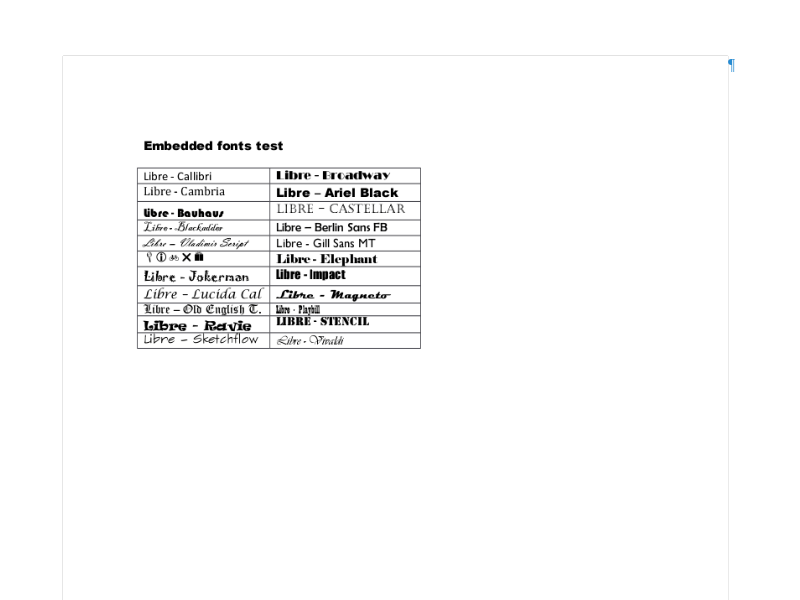

- #LIBREOFFICE OPENOFFICE BUG ALLOWS HACKERS SPOOF UPGRADE#
- #LIBREOFFICE OPENOFFICE BUG ALLOWS HACKERS SPOOF SOFTWARE#
- #LIBREOFFICE OPENOFFICE BUG ALLOWS HACKERS SPOOF CODE#
The Debian Project is recommending the upgrade of golang-1.8 packages after a vulnerability was discovered in the implementation of the P-521 and P-384 elliptic curves, which could result in denial of service and in some cases key recovery. This could include the number of sent and received texts and calls, allowing IMSI-catcher operators to create distinct profiles for each smartphone holder. The AKA version designed for the 5G protocol -also known as 5G-AKA- was specifically designed to thwart IMSI-catchers, featuring a stronger authentication negotiation systemīut the vulnerability discovered last year allows surveillance tech vendors to create new models of IMSI-catchers hardware that, instead of intercepting mobile traffic metadata, will use this new vulnerability to reveal details about a user's mobile activity. This new vulnerability has been detailed in a research paper named "New Privacy Threat on 3G, 4G, and Upcoming5G AKA Protocols," published last year.Īccording to researchers, the vulnerability impacts AKA, which stands for Authentication and Key Agreement, a protocol that provides authentication between a user's phone and the cellular networks.The AKA protocol works by negotiating and establishing keys for encrypting the communications between a phone and the cellular network.Ĭurrent IMSI-catcher devices target vulnerabilities in this protocol to downgrade AKA to a weaker state that allows the device to intercept mobile phone traffic metadata and track the location of mobile phones. Researchers have described this new flaw as more severe than any of the previous vulnerabilities that affected the 3G and 4G standards.įurther, besides 5G, this new vulnerability also impacts the older 3G and 4G protocols, providing surveillance tech vendors with a new flaw they can abuse to create next-gen IMSI-catchers that work across all modern telephony protocols.
#LIBREOFFICE OPENOFFICE BUG ALLOWS HACKERS SPOOF SOFTWARE#
Visma took the decision to talk publicly about the breach to raise industry awareness about the hacking campaign, which is known as Cloudhopper and targets technology service and software providers in order reach their clients.Ī new vulnerability has been discovered in the upcoming 5G cellular mobile communications protocol. According to investigators at cyber security firm Recorded Future, the attack was part of what Western countries said in December is a global hacking campaign by China’s Ministry of State Security to steal intellectual property and corporate secrets.


Reuters reports that hackers working on behalf of Chinese intelligence breached the network of Norwegian software firm Visma to steal secrets from its clients. This is what Zurich believes constitutes "cyber war." According to Zurich, it is not responsible for any payment of the claim if NotPetya was actually “a hostile or warlike action in time of peace or war.” According to Zurich, the NotPetya cyber attack originated with Russian hackers working directly with the Russian government to destabilize the Ukraine. But then Zurich stated that it wouldn't pay any of the claim by invoking a special “cyber war” clause. Originally, Zurich indicated that it might pay $10 million, or about 10 percent of the overall claim.
#LIBREOFFICE OPENOFFICE BUG ALLOWS HACKERS SPOOF CODE#
And NotPetya would seem to fit the definition included in the cyber insurance policy – it was a bit of malicious code that effectively prevented Mondelez from getting its systems back up and running unless it paid out a hefty Bitcoin ransom to hackers. The Zurich American Insurance Company says to Mondelez, a maker of consumer packaged goods, that the NotPetya ransomware attack was considered an act of cyber war and therefore not covered by their policy.Īccording to Mondelez, its cyber insurance policy with Zurich specifically covered “all risks of physical loss or damage” and “all risk of physical loss or damage to electronic data, programs or software” due to “the malicious introduction of a machine code or instruction.” One would think that the language in the cyber insurance policy was specifically designed to be broad enough to protect Mondelez in the event of any kind of cyber attack or hack. Show notes for Security Endeavors Headlines for Week 5 of 2019Ĭheck out our subreddit to discuss this week's headlines!


 0 kommentar(er)
0 kommentar(er)
